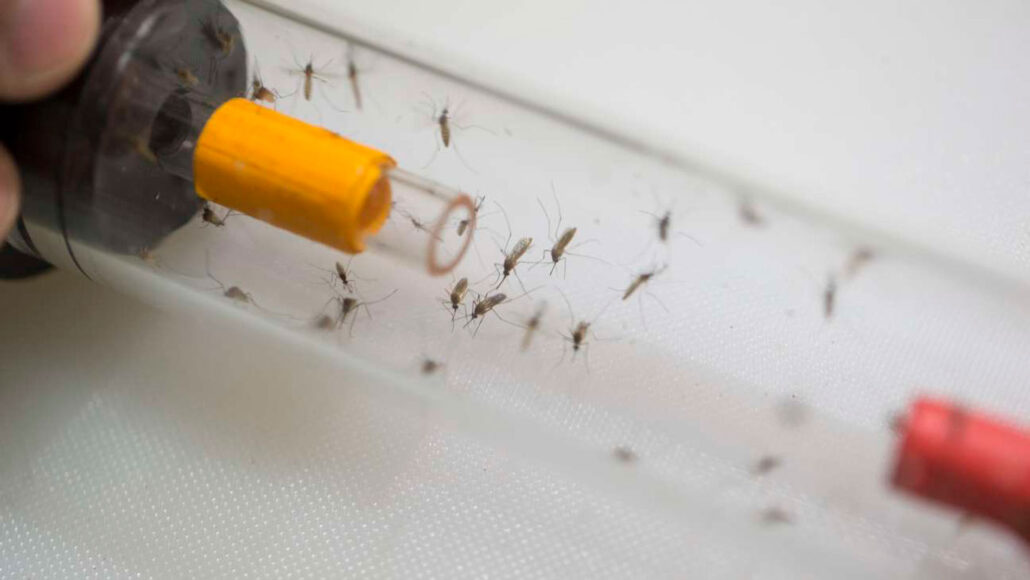Sleepy mosquitoes prefer dozing over dining
And with good reason: Sleep-deprived skeeters lag behind well-rested ones in finding food

Mosquitoes in the lab (pictured here, in a “pooter”) were first observed while napping. Then they were forced to stay awake past their bedtime. Sleep-deprived mosquitoes were less interested in blood.
Andrew Higley/UC
By Anna Gibbs
When you’re super tired, you may be more likely to take a nap than grab a snack. Mosquitoes seem to feel the same way. A new study finds that sleepy mosquitoes are more likely to catch up on missed zzz’s than to drink blood.
That discovery is surprising, says Oluwaseun Ajayi. “We know that mosquitoes love blood a lot.” Ajayi studies sleep behavior in mosquitoes at the University of Cincinnati in Ohio. He was part of a team that shared its new research June 1 in the Journal of Experimental Biology.
Scientists have long been interested in mosquito sleep cycles. These insects spread diseases such as Zika, dengue and malaria. Knowing when a mosquito is awake — and biting — can help limit the spread of those illnesses.
For instance, malaria is often transmitted by mosquitoes that are active at night. Many people protect themselves by slinging nets around their beds. But new research suggests that mosquitoes that feed during the day may also spread the disease. So, scientists are looking for other ways to use mosquitoes’ need for sleep against them.
How to study mosquito sleep
It’s hard to study sleeping bloodsuckers. That’s partly because mosquitoes perk up when they sense a meal: the experimenter. That makes it difficult for the insects to nod off. And when mosquitoes do nod off, they look rather similar to those that are just resting to save energy.
Notes Samuel Rund, that’s a tricky — and often species-specific — question: “How can you tell [when] an insect is sleeping?” This biologist wasn’t involved in the research. But he does study mosquito sleep patterns at the University of Notre Dame in Indiana.
One way to spot a sleeper is by tracking the insect’s behavior. So Ajayi and his colleagues watched mosquitoes doze. The team focused on three species known to carry diseases. The first, Aedes aegypti, is active by day. The second, Culex pipiens, prefers to dine after dusk. The third — the malaria-carrying Anopheles stephensi —is up at night.
All these mosquitoes were left alone in a room in small enclosures. There, the team used cameras and infrared sensors to spy on them.
After about two hours, the mosquitoes appeared to nod off. Their abdomens lowered to the ground and their hind legs drooped. They didn’t move for a long time. And as time went on, C. pipiens and A. aegypti showed less response when the experimenter walked in the room. This hinted that a tasty smell was less likely to wake those species when in a deep sleep. Together, these observations helped the researchers spot a snoozing mosquito.
But what started as a relaxing experiment for the mosquitoes quickly changed gears. The insects were placed in clear tubes that vibrated every few minutes. This kept them from falling into a deep sleep. After four to 12 hours of this sleep deprivation, the team exposed the insects to a pad of heated fake sweat. That pad mimicked the presence of a host on which the mosquitoes could snack. In another experiment, a plucky human volunteer offered up a leg for mosquitoes to feed on for five minutes.
In both cases, the mosquitoes that got a full night’s rest were much more likely to land on the host than sleep-deprived ones. And the leg exposed to sleepy mosquitoes got far fewer bites than when it was exposed to well-rested blood suckers. In eight tests, an average of 77 percent of the well-rested mosquitoes went for a blood meal. Only 23 percent of mosquitoes that were sleepy did the same.
The findings open avenues for research into controlling mosquitoes, Rund says. That, in turn, could help keep people safe from mosquito-spread diseases.







